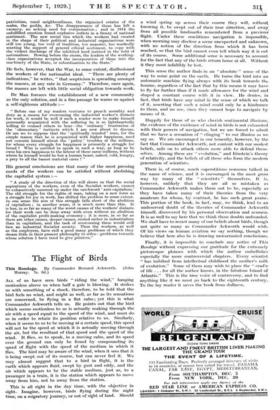The Flight of Birds
This Bondage. By Commander Bernard Ackworth. (John Murray. 7s. 6d.)
ALL of us have seen birds " riding the wind," hanging motionless above us when half a gale is blowing. It strikes us with something of a shock, therefore, to be told that the bird feels no wind, and might as well, as far as its sensations are concerned, be flying in a flat calm ; yet this is what Commander Ackworth tells us. He points out that the bird which seems motionless to us is actually making through the air with a speed equal to the speed of the wind, and must do so in order to retain its position relative to us. Similarly, when it seems to us to be moving at a certain speed, this speed will not be the speed at which it is actually moving through the air, but the resultant of that speed and the speed of the wind. It flies, so to speak, in a moving calm, and its speed over the ground can only be found by compounding its speed of flight with the speed of the medium in which it flies. The bird may be aware of the wind, when it sees that it is being swept out of its course, but can never feel it. We may almost suggest that to a bird in flight, it is the earth which appears fluid, swept by gust and eddy, and the air which appears to be the stable medium, just as, to a passenger in a train, it is the station which appears to move away from him, not he away from the station.
This is all right in the day time, with the objective in sight. Imagine, however, birds flying during the night time, on a migratory journey, or out of sight of land. Should a wind spring up across their course they will, withouc knowing it, be swept out of their true direction, and away from all possible landmarks remembered from a previous flight. Under these conditions navigation is impossible, when morning may disclose a scene unexpected and unknown, with no notion of the direction from which it has been reached, so that the bird cannot even tell which way it is out of its course. Some additional sense is necessary to account for the fact that any of the birds return home at all. Without it they must infallibly be lost.
This sense the author finds in an " absolute " sense of the way to some point on the earth. He turns the bird into an automatic machine flying always with its beak towards the bourne, regardless of the fact that by this means it may have to fly far further than if it made allowance for the wind and shaped a constant course with it in view. He denies, in fact, that birds have any mind in the sense of which we talk of it, asserting that such a mind could only be a hindrance to them, and no use, since they cannot hope to navigate by means of it.
Happily for those of us who cherish sentimental illusions, the evidence of the existence of mind in birds is not exhausted with their powers of navigation, but we are forced to admit that we have a sensation of clinging " to our illusion as we say so. We are encouraged in our temerity, however, by the fact that Commander Ackworth, not content with our modest beliefs, sails on to attack others more able to defend them- selves. Among these are " evolution," and Einstein's theory of relativity, and the beliefs of all those who form the modern generation of scientists.
There is, of course, much superstitious nonsense talked in the name of science, and it is encouraged in the most gross way by ninny of the " scientists " themselves. It is, however, unlikely that they are all so mistaken as Commander Ackworth makes them out to be, especially as they have taken many of their theories from the very amateurs for whom, by contrast, he has such great praise. This portion of the book, in fact, may, we think, lead to an undeserved doubt of the theories of Commander Ackworth himself, discovered by his personal observation and acumen. It is as well to say here that we think those doubts unfounded. We shall have to recast many of our beliefs about birds, though not quite so many as Commander Ackworth would wish. Of his views on human aviation we say nothing, though we believe that here also he is drawing unwarranted conclusions.
Finally, it is impossible to conclude any notice of This Bondage without expressing our gratitude for the extremely picturesque phrases with which the author embellishes especially the more controversial chapters. ' Every scientist " has imbibed from intellectual childhood the mother's milk of evolution." Some of them may wish to place the " cracre of life . .. for all the author knows, in the fabulous Island of Atlantis." This is the true voice of controversy, and to find anything like it we must go back to the eighteenth century. To the lay reader it saves the book from dullness.
































 Previous page
Previous page